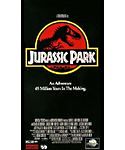| |
| Jurassic
Park |

|
Format: VHS, DVD release set
for June 13, 2000
Label Name: UNIVERSAL
STUDIOS
Street Date: May 13 1997
12:00AM
|
Synopsis/Notes/Quotes
An eccentric billionaire invites two
paleontologists to his private island off South
America where he is constructing a wild animal
park--whose specimens are genetically engineered
dinosaurs! Breakthrough digital effects bring
these extinct animals roaring back to life.
Based on Michael Crichton's ravenous bestseller.
Academy Award Nominations: 3. Academy Awards: 3,
including Best Visual Effects.
Proving dinosaurs are still at the top of the
Hollywood food-chain, Spielberg's "Jurassic
Park" even out-gobbled his great white
shark, and nibbled on three Oscars for dessert.
While "Jurassic Park" is an
above-average action/adventure movie,
jaw-dropping special effects steal the show and
guarantee it will find a place in most
movie-lovers' collections. Spielberg chose to
use revolutionary computer graphic animation to
recreate the dinosaurs, and like the overzealous
scientists in the film, he appears to have taken
their famous bones and resurrected living,
breathing, snapping triceratops, brontosaurs and
Tyrannosaurs. Anyone who has ever wondered what
a real live dinosaur would look like will marvel
at this movie.
"An adventure 65 million years in the
making." -- marketing line for the film
Steven Spielberg's "Jurassic Park"
quickly found its place among the top 6 films
composing Variety's 15 box-office hits of all
time. The film's rise to the top began opening
weekend when it set a record for the biggest
opening day, $18 million, and the highest
grossing three-day opening of all time, $52
million. This estimation doesn't, however,
include inflationary prices which might alter
the film's revenue rank.
Executives also predicted "Jurassic"
would become one of the highest grossing films
in Japan. The film has already become the
highest grossing movie in Britain, not to
mention the biggest hit in international
box-office history, generating over $900 million
in ticket sales.
According to financial analysts, the high
opening weekend revenues were aided by strong
advance sales obtained through telephone
ticketing. MovieFone reported that 30 major
theaters in Los Angeles and New York were
sold-out entirely through the tele-ticketing
service.
The film's estimated cost was between $56 and
$100 million, including the $2 million the
studio paid co-writer Michael Crichton for
rights to his 1990 best-seller novel.
Because Spielberg was concerned with anatomical
accuracy he employed a group of dino-technicians
including: artists, fabricators as well as
paleontologists.
Initially, conventional special effects
techniques were to be supervised by Oscar winner
Stan Winston ("Aliens,"
"Terminator 2,") until Industrial
Lights & Magic's Dennis Muren ("The
Abyss," "T2") convinced him
computer graphics more appropriately suited the
task for the large-scale scenes.
Muren created ostrichlike Gallimimus on his
computer that were so realistic, they left
Spielberg amazed. Computer animators and model
builders began working together thereafter.
Winston's artists created detailed drawings from
the computer pictures, which were then recreated
in clay. From the clay models, large scale
hydraulic skeletons, operable by remote control,
were constructed. Latex skins covered the
skeletons giving the textured appearance of the
outer epidermal surfaces.
The final creations included: a 40 foot-long
Tyrannosaurus rex, predatory velociraptors, a
brachiosaur, and a spitting dilophosaur. The
T-Rex was controlled by a model one-fifth its
scale.
Spielberg's film benefited from recent
scientific discoveries that refute widely held
dinosaur stereotypes.
There were a number of discrepancies between the
book and the film. For example, Crichton's
literary menagerie included 15 dinosaur species
while the film contains only seven.
Though some found the film's premise incredible,
biologists Raul Cano of California Polytechnic
State University at San Luis Obispo and George
Poinar Jr. of the University of California,
Berkeley, disclosed they had cloned DNA from a
40 million-year-old bee preserved in amber. And
according to "Newsweek," scientists at
the American Museum of Natural History in New
York also claimed to have cloned DNA from a 25
million-year-old termite trapped in a similar
mineral. They are still a long way from bringing
creatures to life however.
As Hollywood's preeminent director, Steven
Spielberg was used as a kind of financial savior
for Universal Studios which was hurting
economically prior to the dinosaurian venture.
According to a Universal executive, the strategy
of investing in one big film at the expense of
other films made by the studio is a cost
effective way of operating.
Rated BBFC PG by the British Board of Film
Classification.
TM & Copyright 1993 Universal City Studios,
Inc. and Amlin Entertainment, Inc.
"Jurassic Park" is a registered
trademark of Universal City Studios, Inc. and
Amblin Entertainment, Inc.
Paleontologist Alan Grant and his
paleobotanist girlfriend Ellie Sattler give
lectures on dinosaur history between digs at
remote exotic locales. One dusty afternoon, John
Hammond, a millionaire inspired by scientific
wonders, makes an offer to the erudite couple
that they can't refuse: he asks them to act as
consultants on his entrepreneurial endeavor --
an amusement park with live dinosaurs as the
main attraction.
On an island off the coast of Costa Rica,
Hammond's already biologically engineered living
dinosaurs by extracting and reconstructing dino-DNA
from fossilized insects. But bedlam ensues when
Wayne, a computer genius, tampers with Jurassic
Park's security system so that he can smuggle
out a bunch of frozen embryos. The prehistoric
creatures break loose around feeding time and
the millionaire, the scientists, the park
employees and two children become fair game.
Awards
Academy Awards - Best Sound (1993) -
Nominated
Academy Awards - Best Sound Effects Editing
(1993) - Nominated
Academy Awards - Best Visual Effects (1993) -
Nominated
Homer Awards - Video of the Year (1993) -
Nominated
Homer Awards - Laserdisc of the Year (1994) -
Won
Release Details
Release Company: Universal Studios Home Video
Release Format: VHS
Rating: PG-13 (MPAA)
Running Time: 127 minutes
Recording Mode: Dolby Surround
Noise Reduction: (unknown)
Digital Process: Digitally Processed
Screen Format: Standard
Audio: HiFi Sound, Surround Sound, Digital
Sound, Stereo Sound
Closed Captioned
|
d r a l a n g
r a n t . t r i p o d . c o m